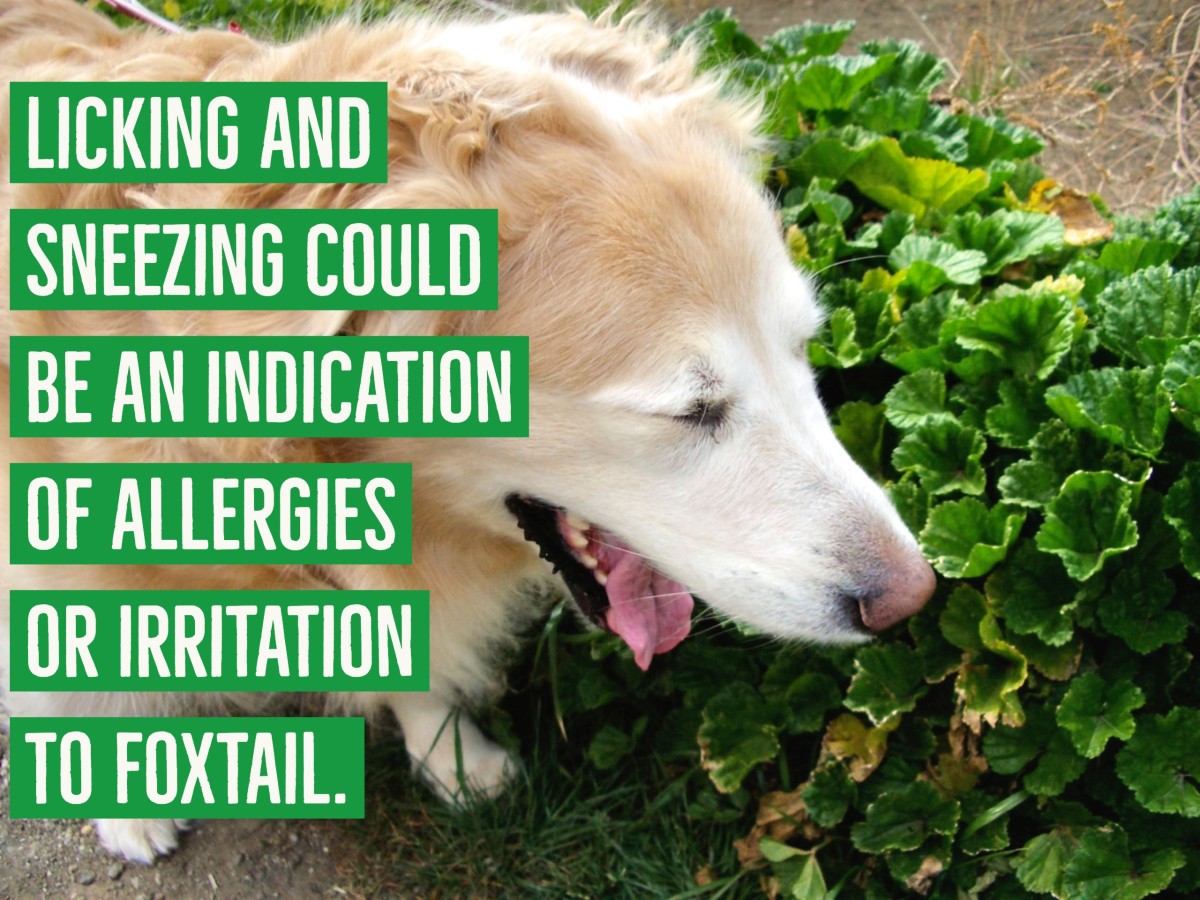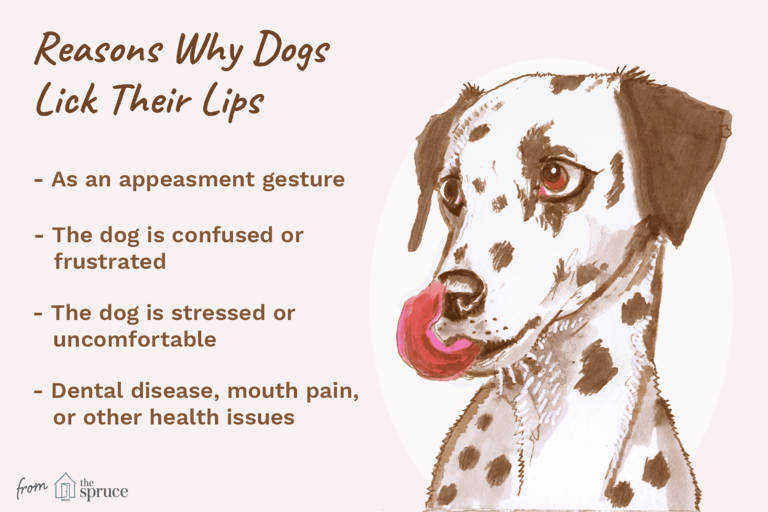When a dog licks their lips, it could signal stress or anxiety. This behavior may also indicate feeling nauseous or anticipating a treat.
Dog behavior, such as lip licking, can provide valuable insights into their emotional and physical state. Observing and understanding these cues is crucial for pet owners to ensure their dog’s well-being. When a dog licks their lips excessively without any food or presence of a trigger, it could be caused by stress or discomfort.
It’s important to pay attention to context and other accompanying behaviors to determine the root cause of the lip licking. By recognizing these signs, pet owners can take appropriate action to provide comfort and address any underlying issues their furry companions may be facing.
Signs Of Anxiety Or Stress
When a dog licks their lips excessively, it can be a sign of anxiety or stress. This behavior may indicate that the dog is feeling uncomfortable or overwhelmed in their environment. It’s important to observe other signs and consult with a veterinarian if necessary to address their emotional well-being.
Pacing And Panting
Dogs have a unique way of communicating with us, sometimes without even barking or wagging their tails. One of these ways is through licking their lips. While it’s normal for dogs to do this occasionally, it can also indicate signs of anxiety or stress. Pacing and panting are two such signs that can help us understand what our furry friends are feeling.When a dog paces, it means they are repeatedly moving back and forth in a confined area. This behavior is often seen when a dog is anxious or stressed. It could be due to various stimuli such as loud noises, unfamiliar surroundings, or separation anxiety. Pacing and panting often go hand in hand. Panting is a way for dogs to cool themselves down, but it can also signify stress and discomfort.Observing your dog’s behavior and body language is crucial in understanding their emotions. If you notice your dog pacing and panting excessively, it’s essential to consider the possible causes. Is there something in their environment that is stressing them out, or are they experiencing separation anxiety when you leave the house? Identifying the triggers can help alleviate their anxiety and provide them with a sense of security.Excessive Drooling
Excessive drooling is another sign that your dog may be feeling anxious or stressed. While dogs naturally produce saliva to aid in digestion, excessive drooling is not normal and could be an indicator of a problem. When dogs are anxious or stressed, they may drool excessively due to increased saliva production as a physiological response.If you notice your dog drooling excessively in situations that don’t typically cause excitement or anticipation, it’s crucial to look for other signs of anxiety or stress. This could be trembling, hiding, or avoiding eye contact. Identifying the underlying cause of your dog’s anxiety or stress is essential to provide them with the appropriate support and help them feel more secure. Providing a calm and safe environment for your dog is crucial in reducing their anxiety and stress levels. If you find that your dog’s drooling continues even after implementing strategies to alleviate their anxiety, it’s essential to consult a veterinarian. They can help rule out any underlying medical conditions and provide guidance on managing your dog’s anxiety or stress effectively.Understanding the signs of anxiety or stress in dogs, such as pacing and panting, as well as excessive drooling, can help you better support your furry friend. By observing their behavior and addressing any triggers, you can help create a more relaxed and comfortable environment for them, promoting their overall well-being.
Credit: pethelpful.com
Physical Discomfort
Dogs communicate their feelings and discomfort through various behaviors, including lip licking. Understanding the reasons behind this behavior can help you identify and address any underlying issues that may be causing physical discomfort for your furry friend.
Dental Issues
Poor dental health can lead to discomfort and pain for dogs, causing them to lick their lips as a response to the discomfort. Issues such as gingivitis, tooth decay, or periodontal disease can cause inflammation and pain in the mouth, leading to excessive lip licking.
Nausea Or Digestive Problems
Lip licking can be a sign of nausea or digestive problems in dogs. Gastrointestinal issues such as upset stomach, acid reflux, or constipation can lead to discomfort, prompting dogs to lick their lips as a natural response to the discomfort they are experiencing.
Fear Or Anticipation
Dogs communicate through body language, and one such behavior is lip licking. This action can convey various emotions, including fear or anticipation. Understanding the reasons behind your dog’s lip licking can help you respond appropriately to their needs.
Licking Before A Stressful Event
Lip licking in dogs before a stressful event often indicates nervousness or discomfort. This could be observed before a visit to the veterinarian, car rides, or during encounters with unfamiliar people or animals. It’s essential to recognize these signals as it allows you to comfort and reassure your dog in such situations.
Fear Of Punishment
Dogs may also lick their lips as a sign of fear, especially if they have previously experienced punishment. Fear of punishment can lead to lip licking, along with other submissive behaviors such as cowering or avoidance. It’s crucial to create a positive and supportive environment for your dog to alleviate this fear.
:strip_icc()/Dog-licking-lips-GettyImages-510835832-587e47285f9b584db3d011a6.jpg)
Credit: www.thesprucepets.com
Submission Or Appeasement
When a dog licks their lips, it can often be a sign of submission or appeasement towards another dog or person. Dogs have their own unique way of communicating with each other and with humans, and lip licking is just one of the many signals they use to convey their intentions and emotions.
Licking As A Calming Signal
Dogs use various body language cues, also known as calming signals, to communicate that they are not a threat and want to avoid conflict. Lip licking is one of these signals and is commonly seen when a dog is feeling stressed, anxious, or wants to diffuse a tense situation. It’s their way of showing that they mean no harm and are trying to establish peace.
By licking their lips, dogs are essentially telling the other party that they are not a threat and are willing to submit. It’s like saying, “Please don’t hurt me, I am friendly and just trying to make things better.” This behavior is often observed during interactions with dominant dogs or when a dog feels intimidated by a human.
Showing Respect To Dominant Dogs
When a dog licks their lips in the presence of a dominant dog, it is a sign of deference and respect. Dogs have a hierarchical social structure, and they instinctively understand the importance of respecting their superiors. By licking their lips, the submissive dog is acknowledging the dominant dog’s authority and showing that they pose no threat.
This behavior helps to maintain harmony within the canine group by preventing conflict and aggression. It’s a way for dogs to establish and reinforce their social bonds, ensuring that everyone understands their place in the pack.
It’s important to note that excessive lip licking can also be a sign of discomfort or even medical issues, such as gastrointestinal problems or dental pain. If you notice your dog frequently licking their lips without any apparent reason, it’s best to consult with a veterinarian to rule out any underlying health issues.
Attention-seeking Behavior
Understanding your dog’s behavior and body language is crucial for effective communication. One common behavior to take note of is when a dog licks their lips. While this action may seem harmless and inconsequential, it can actually be a sign of attention-seeking behavior. When your furry friend licks their lips, it may indicate their desire for attention or interaction from you. Let’s explore some specific situations where this behavior can manifest.
Begging For Food
Dogs are known for their love of food, and licking their lips can be a subtle way of begging for a tasty treat. This behavior often occurs when your dog sees or smells something delicious, and they want to share in the culinary experience. It’s important to establish boundaries and avoid giving in to their begging, as it can reinforce this attention-seeking behavior. Instead, offer your pup a healthy, dog-friendly snack that they can enjoy without disrupting their training or diet.
Getting Petted Or Scratched
Another reason why dogs may lick their lips is to seek physical affection from their owners. It’s no secret that pets thrive on attention and love being petted or scratched behind the ears. When your furry companion licks their lips in this context, it’s an indication that they want affection and snuggles. By recognizing this behavior, you can provide the quality time and interaction your dog desires, strengthening your bond and creating a supportive and loving environment for your four-legged friend.

Credit: pethelpful.com
Frequently Asked Questions On What Does It Mean When A Dog Licks Their Lips
Why Do Dogs Lick Their Lips?
Dogs use lip licking as a way to communicate stress, anxiety, or fear. It could also be a sign of anticipation or excitement. It’s important to observe other body language cues to understand the underlying meaning behind their lip licking behavior.
Is Lip Licking A Sign Of Sickness In Dogs?
Lip licking can be a symptom of gastrointestinal issues or nausea in dogs. If your dog is lip licking excessively and showing other signs such as vomiting or loss of appetite, it’s best to consult a veterinarian for proper diagnosis and treatment.
Can Lip Licking In Dogs Be A Sign Of Submission?
Yes, lip licking can be a submissive behavior in dogs. When a dog licks their lips, it can be a way of showing deference to a dominant individual or to diffuse a tense situation. It’s essential to consider other context cues to interpret the dog’s overall behavior accurately.
How Do I Know If My Dog Is Stressed When They Lick Their Lips?
If your dog exhibits lip licking along with other signs such as panting, yawning, or avoiding eye contact, it can be an indication of stress or anxiety. Providing a calm and secure environment for your dog and practicing positive reinforcement training techniques can help alleviate their stress.
Conclusion
To sum up, when a dog licks their lips, it can signify various things such as stress, anxiety, or anticipation of food. It’s essential for dog owners to pay attention to their pet’s body language and overall behavior to determine the reason behind this behavior.
If the licking persists or is accompanied by other concerning symptoms, seeking professional advice from a veterinarian is always recommended. Understanding your dog’s communication cues can strengthen the bond between you and your furry friend.



